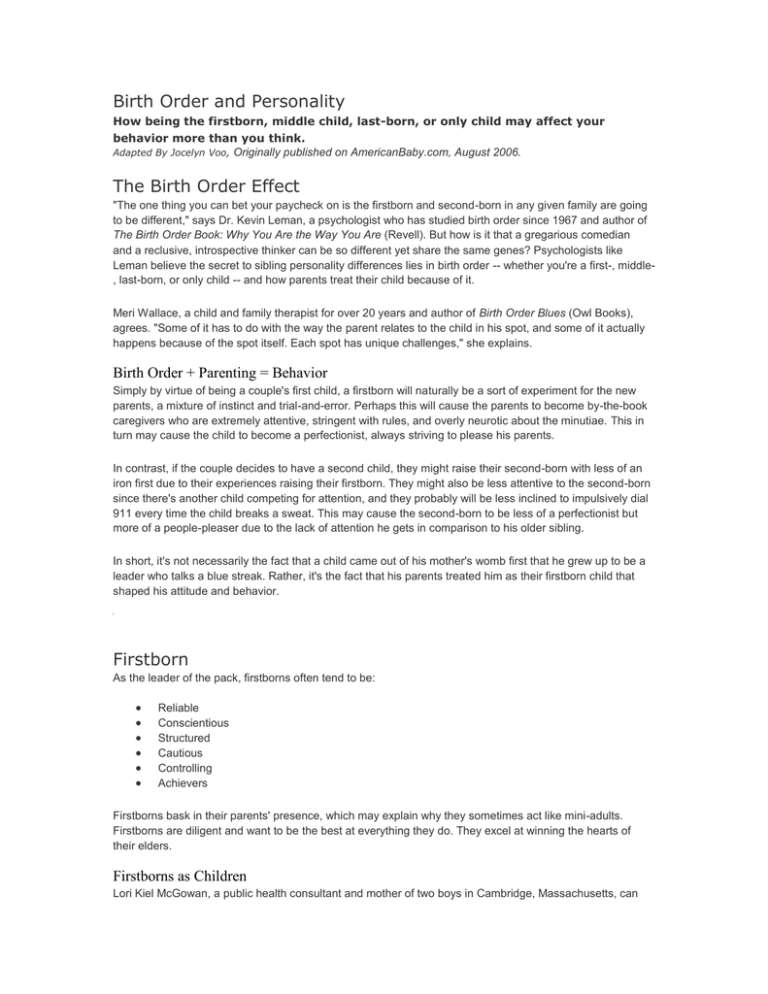
Birth Order and Personality
How being the firstborn, middle child, last-born, or only child may affect your
behavior more than you think.
Adapted By Jocelyn Voo, Originally published on AmericanBaby.com, August 2006.
The Birth Order Effect
"The one thing you can bet your paycheck on is the firstborn and second-born in any given family are going
to be different," says Dr. Kevin Leman, a psychologist who has studied birth order since 1967 and author of
The Birth Order Book: Why You Are the Way You Are (Revell). But how is it that a gregarious comedian
and a reclusive, introspective thinker can be so different yet share the same genes? Psychologists like
Leman believe the secret to sibling personality differences lies in birth order -- whether you're a first-, middle, last-born, or only child -- and how parents treat their child because of it.
Meri Wallace, a child and family therapist for over 20 years and author of Birth Order Blues (Owl Books),
agrees. "Some of it has to do with the way the parent relates to the child in his spot, and some of it actually
happens because of the spot itself. Each spot has unique challenges," she explains.
Birth Order + Parenting = Behavior
Simply by virtue of being a couple's first child, a firstborn will naturally be a sort of experiment for the new
parents, a mixture of instinct and trial-and-error. Perhaps this will cause the parents to become by-the-book
caregivers who are extremely attentive, stringent with rules, and overly neurotic about the minutiae. This in
turn may cause the child to become a perfectionist, always striving to please his parents.
In contrast, if the couple decides to have a second child, they might raise their second-born with less of an
iron first due to their experiences raising their firstborn. They might also be less attentive to the second-born
since there's another child competing for attention, and they probably will be less inclined to impulsively dial
911 every time the child breaks a sweat. This may cause the second-born to be less of a perfectionist but
more of a people-pleaser due to the lack of attention he gets in comparison to his older sibling.
In short, it's not necessarily the fact that a child came out of his mother's womb first that he grew up to be a
leader who talks a blue streak. Rather, it's the fact that his parents treated him as their firstborn child that
shaped his attitude and behavior.
Firstborn
As the leader of the pack, firstborns often tend to be:
Reliable
Conscientious
Structured
Cautious
Controlling
Achievers
Firstborns bask in their parents' presence, which may explain why they sometimes act like mini-adults.
Firstborns are diligent and want to be the best at everything they do. They excel at winning the hearts of
their elders.
Firstborns as Children
Lori Kiel McGowan, a public health consultant and mother of two boys in Cambridge, Massachusetts, can
attest to that. She describes her 6-year-old firstborn son Kiel as a cautious boy who prefers the company of
adults or younger children compared to that of his peers. "For his sixth birthday, we invited six friends of his
choosing," McGowan recalls. "For maybe the first half hour to 45 minutes, he crawled into a corner behind a
booth and cried. These were close friends from school and after-school and the neighborhood. But after [his
cautiousness waned], he came out and had a great time." When presented with a new situation, Kiel's
cautious nature manifested itself in temporary introversion. However, once he became acclimated to his new
environment, his caution subsided.
Moreover, as for his behavior around his younger brother Fionn, Kiel plays the role of the "controlling big
brother" to a T: "He alternately tries to hug him and push him down, or gets a toy or juice for him, and then
takes something away to make him scream," McGowan says. "It's definitely a sibling love/hate thing."
The Grown-Up Firstborn
As firstborns grow older, their traits are not necessarily lost. Firstborn child Tracy Rackauskas, a 35-year-old
from Denver, fully identifies herself as an achiever. "I want to be the best dressed, in a quirky-fashionable
way; I want to have the best fantasy football team; I want to be the best editor; I want to be the most
insightful and understanding partner; I want to be the sexiest and the smartest and the most interesting,"
Rackauskas says. "And it's not because I'm really competitive or want to be better than anybody else, but
just because I want to be the best." Her ambition carried over to her studies in law school, where she studied
all the time and prepared for exams by making her own outlines according to her specific organization
system. Perhaps in part due to her diligence, Rackauskas graduated summa cum laude and now works as a
legal editor, making sure everything that passes through her hands meets her standards.
Middle Child
"The middle child often feels left out and a sense of, 'Well, I'm not the oldest. I'm not the youngest. Who am
I?'" says therapist Meri Wallace. This sort of hierarchical floundering leads middle children to make their
mark among their peers, since parental attention is usually devoted to the beloved firstborn or baby of the
family.
In general, middle children tend to possess the following characteristics:
People-pleasers
Somewhat rebellious
Thrives on friendships
Has large social circle
Peacemaker
Middle Kids as Children
Holly Schrock, a 31-year-old at-home mother of five in Newtown, Pennsylvania, describes her second-born
child Maggie as an attention-getter with a mildly rebellious streak. "You'll say to her 'Go pick up the laundry
right now' or 'Go put on your bathing suit so we can go to the pool,' and if she's in the middle of something,
she'll look at you bald-faced and say, 'No!'" Schrock says.
However, "middle children are the toughest to pin down because they do play off their older sibling," says
Dr. Leman. For instance, the sex of the child is a big variable. If the firstborn child is a boy and the middle
child is a girl, she may possess firstborn characteristics because though she is technically second-born, she
is also the firstborn female. As the second-born child with an older brother, 4-year-old Maggie also qualifies
as the firstborn female in the family, which may explain why she also possesses the nurturing leader
qualities of a firstborn child. "Maggie likes to be a little mommy, especially to the younger ones." Schrock
says. "She picks up her 2-year-old brother and tries to tend to his needs in a positive way. She's protective
of them."
The Grown-Up Middle Child
Schrock herself is also a middle child. Sandwiched between an older and younger sister, Schrock exhibited
the same rebellious streak that her daughter Maggie does. "I wasn't a bad kid, but I was definitely pushing
the envelope a little," Schrock says. In fact, at one point during her teen years, Schrock became embroiled in
an argument with her parents that resulted in her running away for three days. Though Schrock admits she
has since calmed down a bit, she still won't take anyone's guff. "I don't like being told what to do, period."
Last Born
Youngest children tend to be the most free-spirited due to their parents' increasingly laissez-faire attitude
towards parenting the second (or third, or fourth, or fifth...) time around. The baby of the family tends to be:
Fun-loving
Uncomplicated
Manipulative
Outgoing
Attention-seeker
Self-centered
Lastborns as Children
Megan, an at-home mom in San Diego, says her 7-year-old daughter Kacey loves the spotlight and will
wrestle it away from others, if need be. "Kacey loves to go out into our backyard and put on shows," Megan
says. "One time she was out there roller skating with her older sister, Jessica, but when Jessica started
skating in these pirouettes that Kacey couldn't do, Kacey deliberately fell down to get our attention."
The Grown-Up Lastborn
Lastborn child Janice Lee, now 25 years old and working as an architect in New York City, definitely
identifies with the simplistic, uncomplicated nature of a last-born child. "Most girls would die if their
boyfriends didn't get them something for their birthday," she says. "But my boyfriend and I don't exchange
gifts on our birthdays or anniversaries. We're very low-key. We'll go out to dinner, but nothing extravagant."
Lee also has a pie-in-the-sky, "everything will work out" worldview: "I don't need to have that much security
in my life. I like being spontaneous. I moved to Germany from Toronto for a job last year, and I didn't even
speak the language," she says.
Only Children
Being the only child is a unique position in a family. Without any siblings to compete with, the only child
monopolizes his parents' attention and resources, not just for a short period of time like a firstborn, but
forever. In effect, this makes an only child something like a "super-firstborn": only children have the privilege
(and the burden) of having all their parents' support and expectations on their shoulders. Thus, only children
tend to be:
Mature for their age
Perfectionists
Conscientious
Diligent
Leaders
Only Children as Kids
Just one meeting with 5-year-old Lilia, and you'll see. "She has a sophisticated sense of humor and is often
one of the few girls her age to get a sarcastic remark or double-meaning," says Lilia's mother Razan
Brooker, a software business owner in Boston. "Her teachers are very surprised at her level of
understanding of adult humor." Even as a younger child, Lilia exhibited noticeable maturity and diligence.
Like most children, Lilia sucked her thumb. But rather than throwing a temper tantrum when asked to break
the habit, "she agreed to it and threw away her 'blankie,' claiming that is what makes her want to suck her
thumb," Brooker says. "She then proceeded to make a chart for herself consisting of 30 squares for the
number of days she was told it will take her to break the habit." A month later, Lilia was sleeping with her
hands by her side.
The Grown-Up Only Child
Even when only children reach adulthood, they may not necessarily shed their need to be model human
beings, able to run a five-minute mile and cook a seven-course meal without consulting a cookbook. "I
hosted a Christmas party at my apartment and had to make sure the champagne was chilled, the music was
on, the cats were locked in the kitchen," says Margaret Lloyd, a 27-year-old New York advertising associate.
"Even after guests arrived, I kept fussing with things, even though it probably took away from some of my
enjoyment that evening."
Exceptions to Traditional Birth Order Structure
Blended Families: In the case of divorce, remarriage, and the melding of stepchildren, Dr. Leman says,
"blended families don't blend; they collide." Firstborn children who used to be the leader of the pack may find
themselves unceremoniously thrown off the top of the hill by an older stepsibling, and the youngest of the
family may suddenly have to deal with all the attention that's segued towards the new baby.
But despite a child's new position in a blended family hierarchy, he will not tailor his existing personality to
his new position unless he is still in infancy. Many psychologists agree that personality develops
tremendously during the first few years of life during the bonding stages. By about age 5, much of a child's
personality has been established (although that doesn't mean it's fixed). In this way, a 10-year-old firstborn
will likely have a more difficult time giving up his position as the eldest than a 4-year-old might.
Families Within Families: In cases such as with twins, you have a family within a family -- a unit that
operates independently of birth order. "A twin will never act like a middle-born; he will always act like a
firstborn or a baby," Leman says. Since twins are perceived as a single unit -- likely even referred to as "the
twins" -- they separate themselves from the traditional family and revel in their special position.
Gap Children: According to Leman, if you have a gap of at least five years in between births, another family
begins in the birth order structure. A 2-year-old boy with a newborn brother and an 8-year-old older sister
isn't going adopt middle-child traits, but rather those of a firstborn.
Adoption: The same scenario occurs with adopted kids. The age at which the child is adopted is a key
factor in which traits the child is most likely to exhibit. The younger the child is at adoption, the more time he
will spend under the adoptive parents' care and adopt his position in the existing family tree. For instance, if
a firstborn 1-year-old is adopted by a family with a 4-year-old child, the adopted child will likely fall into the
role of the baby, despite the fact that he is biologically a firstborn child. However, if a firstborn child is 7 years
old when he is adopted into a family with a 10-year-old child, the adopted child will still act like a firstborn
even though he has an older brother. "You don't give up being a firstborn," says Leman. "You take the birth
order with you."
Peers vs. Siblings vs. Parents: Who Influences?
Recent studies suggest that siblings may be the key players in forming a child's personality. Other experts
insist that peers have the magic touch. To date, researchers are unable to pin down the definitive shaper of
a child's personality, but there is one thing that remains constant in all competing theories: Most children
have a parental figure to latch onto and learn from.
Though peers, siblings, genes, and circumstance all indubitably play into how a child's temperament
develops, "I think the parents still are the major influencing factors because, truthfully, the first year of life is
the bonding with the primary caretaker that impacts upon self-confidence, trust, the ability to interact with
another person," says therapist Wallace. Now, whether or not this primary caretaker is actually the biological
parent is negligible, considering the increasingly changing definition of the modern "family." Instead, it's the
experiences shared by child and parental figure that leaves the lasting impression.
Is Personality Fixed?
Fear not, supposedly manipulative, attention-hungry youngest children! Psychologists agree that personality
is not fixed by birth order. "You can consciously make a choice [to change]," says therapist Wallace, who
outlines three basic steps to becoming a new you:
1.
2.
3.
Make a connection with your behavior and your position in the family hierarchy. Do people
always call you a neurotic nitpicker just because you always have to have things done just right? It
may not be your fault, Perfectionist Firstborn.
Identify how you feel because of it. Your 4-year-old wants to wear a purple sweater, blue jeans,
and orange boots to school. But trying to talk your kid out of looking like Rainbow Brite is a futile
battle, and the daily fight in the morning leaves you exhausted.
Deliberately change your behavior. No matter how much you want to dress your child like a
cover girl (or at least not like a mini Courtney Love), restrain yourself from criticizing her outfit. If you
think about it, it won't kill you to let your child exercise some choice in her wardrobe, and may even
encourage her to be more independent and creative in the long run. Now, on the other hand, if it's
your husband who's planning on leaving the house wearing black socks and Tevas....
The information on this Web site is designed for educational purposes only. It is not intended to be a
substitute for informed medical advice or care. You should not use this information to diagnose or treat any
health problems or illnesses without consulting your pediatrician or family doctor. Please consult a doctor
with any questions or concerns you might have regarding your or your child's condition.
© Copyright 2006 Meredith Corporation. All Rights Reserved.




